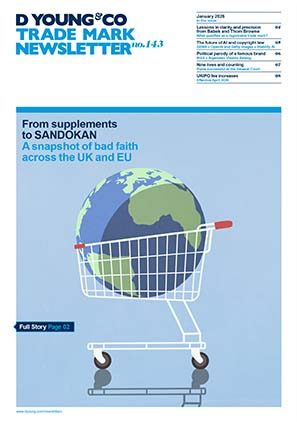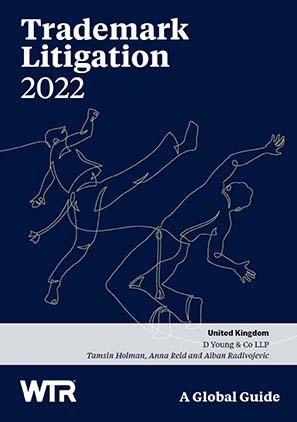EUIPO appeal cases: validity of UK rights post Brexit
Following Brexit and the end of the transition period on 31 December 2020, European Union trade marks (EUTMs) can no longer be rejected, opposed or invalidated on the basis of rights which exist in the UK only. An opposition or invalidity action that was pending on 01 January 2021 in the EU and based solely on UK rights will be dismissed. A number of recent decisions have examined the extent to which UK rights are now considered valid in appeal cases.
Indo European Foods Ltd v EUIPO
In 2017, Hamid Ahmad Chakari applied to register the figurative mark shown below as an EUTM for various goods including rice flour. The mark incorporates the wording “Abresham Super Basmati Selaa Grade One World’s Best Rice”.

Webinar case summary
We have published a short webinar about this article that can be accessed on demand:
View webinarThe EUTM application was opposed by Indo European Foods Ltd, on the basis of the earlier unregistered word mark in the UK, BASMATI, used to refer to rice. Indo European Foods argued that it was entitled to prevent use of the mark applied for under the “extended” form of passing off in the UK.
In 2019, the Opposition Division rejected the opposition in its entirety. It found that the evidence submitted by Indo European Foods was insufficient to prove that the earlier mark BASMATI had been used in the course of trade of more than mere local significance before the relevant date and in the relevant territory.
Indo European Foods subsequently appealed to the Board of Appeal, which issued a decision in April 2020 dismissing the appeal as unfounded. Although it accepted that Indo European Foods had built up goodwill in the mark BASMATI, the Board of Appeal found that they had failed to demonstrate that use of the mark applied for could result in a misrepresentation of the mark BASMATI. The Board of Appeal also found that use of the mark applied for could not cause a direct loss of sales for Indo European Foods, since the contested goods were goods other than rice, whereas Indo European Foods sold only rice. Likewise, there was no argument to explain how use of the mark applied for could affect the distinctiveness of the name “basmati”, taking into account that “super basmati” was a recognised variety of basmati rice.
Indo European Foods further appealed to the General Court. The EUIPO contended that the General Court should dismiss the appeal. The EUIPO firstly claimed that given the opposition was based on an earlier unregistered trade mark in the United Kingdom, and in view of the withdrawal of the UK from the European Union and the expiry of the transition period, the opposition procedure and present appeal were deprived of their purpose.
However, the General Court noted that the contested EUTM application was applied for in 2017, when the UK was a member of the European Union, and the contested decision of the Board of Appeal was taken in April 2020, during the transition period. It held that since the purpose of appeals to the General Court is to review the legality of decisions of the EUIPO Boards of Appeal, the General Court must take into account the date of the contested decision when assessing that legality. Accordingly it held that the earlier unregistered word mark in the United Kingdom relied on by Indo European Foods in support of the opposition and its appeal is capable of forming the basis of the opposition.
Turning to the substantive issues, the General Court found that the Board of Appeal had erred in its findings and held that misrepresentation was established and damage is liable to arise. The Board of Appeal’s decision was subsequently annulled.
Teatox GmbH v Burnfatea LLP
This EUIPO Board of Appeal decision highlights the importance of appointing the appropriate representation following the end of the transition period in ongoing EU cases.
In May 2014, the German company Teatox GmbH registered their “Teatox” EU trade mark for goods and services related to teas, medicinal teas and infusions, asthmatic teas, tea pots and tableware, candy, cookies, coffee, cocoa and flavoured beverages. In December 2018, Burnfatea LLP, based in the UK, sought to strike “Teatox” off the register, stating that “Teatox” has become a common name in trade, namely a generic descriptive term for “Tea Detox” in the United Kingdom. It was argued that “Teatox” was widely used by UK companies and understood by its customers, to mean Tea Detox. Evidence, such as printouts from Google, articles from Virgin Media television, the BBC and the Huffington Post were submitted in support of this claim. Additionally, it was argued that Teatox GmbH failed to take appropriate measures to defend their mark from being used as a generic term on the market, in the media and by end users, which resulted in “Teatox” being interchangeably used with Tea Detox and Detox Tea by many in the tea industry.
In May 2020, the Cancellation Division partially revoked “Teatox” for goods and services related to medicinal tea, medicinal infusion, asthmatic tea, tea based beverages and the wholesale and retail of these goods.
In June 2020, Teatox GmbH filed an appeal requesting that the decision be set aside. In response, Burnfatea LLP requested for the appeal to be dismissed. Whilst the appeal was filed within the transition period, it was not until May 2021 that the Board of Appeal informed Burnfatea LLP of a deficiency regarding the mandatory representation in accordance with Article 119(2) EUTMR. As Burnfatea LLP was not based within the EEA, it was necessary for them to appoint an authorised professional representative to stand before the EUIPO. Failure to do so would lead to any procedural steps and documents submitted to be deemed inadmissible.
In addition, it was noted that the majority of the evidence submitted to prove that “Teatox” had become a common name for the goods and services in question was UK related and therefore could no longer be taken into account given that the UK is not part of the European Union. Consequently, the Board of Appeal invited the parties to submit their observations and complete the evidence.
Burnfatea LLP’s argued that “no additional representation could be made” and that the procedural steps and documents submitted when the deficiency did not yet exist must be considered admissible. However, this was rejected by the Board of Appeal which proceeded to grant the appeal and annul the contested decision in its entirety.
The key distinguishing point here is that the contested decision had to be re-examined by the Board of Appeal after the end of the transition period, taking into account whether or not a new decision with the same operative part as the decision under appeal may be lawfully adopted at the time of the appeal ruling.

